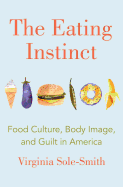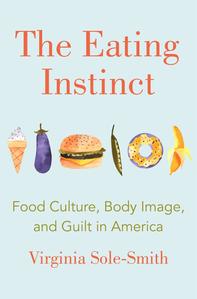
 Good food, bad food, right food, wrong food. For many people, external pressures and ideologies inform how they eat--so much so that they can lose track of what their bodies are telling them. Virginia Sole-Smith, a writer and editor, began to re-evaluate her ideas about food when her baby daughter, Violet, suffered a medical trauma that made her stop eating for two years. The Eating Instinct is her memoir of this experience, given broader context by her research and interviews. "Violet taught me that eating well cannot be about following rules; it has to be about trusting our own instincts, which value safety, comfort and pleasure just as much as nutrition, and sometimes more."
Good food, bad food, right food, wrong food. For many people, external pressures and ideologies inform how they eat--so much so that they can lose track of what their bodies are telling them. Virginia Sole-Smith, a writer and editor, began to re-evaluate her ideas about food when her baby daughter, Violet, suffered a medical trauma that made her stop eating for two years. The Eating Instinct is her memoir of this experience, given broader context by her research and interviews. "Violet taught me that eating well cannot be about following rules; it has to be about trusting our own instincts, which value safety, comfort and pleasure just as much as nutrition, and sometimes more."
When her daughter drank chocolate milk or ate a cheese cracker, Sole-Smith felt horrified, even though the goal was to get her to eat anything by mouth, the higher in calories the better. Many parents fall into anxious micromanagement of their child's food intake, often with unexpected results. And when disconnection from instinct turns into an eating disorder or obesity, "we reach a crossroads: Do you try to correct the behavior--learning to eat according to a prescribed set of external rules and conditions--or do you try to rediscover those internal cues that tell us when to eat or when to stop? It's a divisive question among doctors, therapists, and anyone who studies food."
We search for a perfect set of rules, "a way to feed ourselves that... feels simple and right. That doesn't make us feel guilty about everything we put into our bodies." But Sole-Smith discovers that the wellness and nutrition professionals we look to are as susceptible to diet culture as the rest of us, and often struggle with their own disordered eating. Though her emphasis is on the experiences of women, Sole-Smith explores U.S. food culture across lines of class and race. Restrictive diets, the popularity of weight-loss surgery and fads for "clean eating" and "detoxing" are among her targets. She talks to food professionals and people grappling with eating disorders, including the growing category of "orthorexia," in which a person's obsession with healthy eating actually damages their health.
To demand a program from her would be to miss her point, but if Sole-Smith has any advice in conclusion, it is to take a risk and trust yourself more with food. --Sara Catterall
Shelf Talker: After a medical trauma made her baby reject food for two years, a writer explores the disordered food culture of the U.S.

